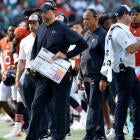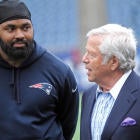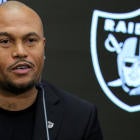You can pluck Matt Nagy off the Andy Reid coaching tree, but you can't entirely remove all of Reid's leaves from Nagy. On Sunday, Nagy provided Chicago with a reminder that for all of the good he's brought and should continue to bring to the Bears this season, his late-game management remains a liability -- in the same way Reid's high-leverage decision making has cost the Chiefs over the years despite all the good he's done for Kansas City.
The Bears went into Miami on Sunday and lost a game they should've won when Dolphins kicker Jason Sanders drilled a 47-yard field goal as time expired in overtime. There's plenty of blame to go around from Mitchell Trubisky to Jordan Howard to a defense that wilted in the South Beach heat, but the fact remains that the Bears were in a position to escape with an overtime win until Nagy dedicated his final offensive series to the spirit that inhabits Reid's body whenever the Chiefs are in a high-pressure situation.
After Dolphins running back Kenyan Drake fumbled away a win on the goal line in overtime, the Bears marched downfield, looking like a team intent on punching the ball into the end zone and getting the hell out of Miami with a win. Howard totaled 34 yards on consecutive carries. Suddenly, the Bears were at the Dolphins' 41-yard line against a defense offering no resistance.
And that's when Nagy decided to play for a long field goal.
He called for a Tarik Cohen run on first down, which is fine. Running the ball got them to this point. Why not go back to what had been working?
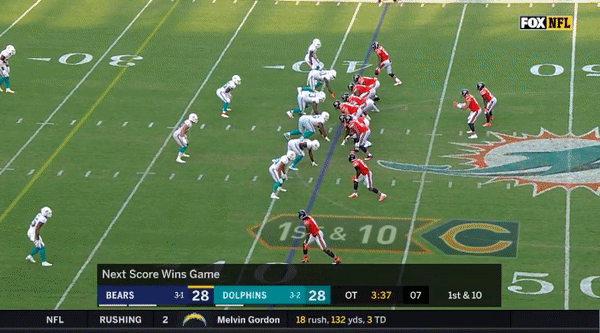
On second-and-8 from the 39, Benny Cunningham carried the ball for four yards. It does, however, look like Trubisky decided to hand the ball off rather than throw it. Note how the receivers are running routes as if Trubisky had the option to either run or pass. Again, this is acceptable.

On third-and-4 from the 35-yard line, the Bears ran again. They got shut down at the line of scrimmage in a predictable outcome.
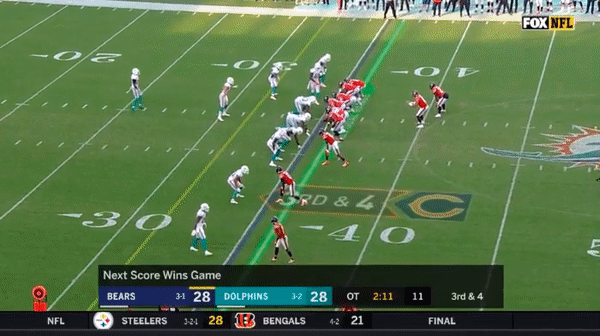
That's three straight runs when the Bears were on the edge of field goal range, which is as vanilla as it gets for a team that usually tries to be as creative as possible. Maybe Nagy left it up to Trubisky to decide to run or pass on second down, but it doesn't sound like he left it up to Trubisky on third down.
It sounds like he didn't want Trubisky to drop back to pass.
Matt Nagy on second-guessing about the 3rd down run call in OT: "We could do that all day. If we throw it, then you’re up here asking me why we took a sack."
— Adam Hoge (@AdamHoge) October 14, 2018
Even though Trubisky's skillset features more athleticism than most quarterbacks -- he ran for 47 yards on eight attempts -- Nagy didn't call for a safe play that rolled Trubisky out of the pocket and gave him the choice to run or throw. Even though Trubisky averaged 10.2 yards per attempt and completed over 70 percent of his passes, Nagy refused to let his quarterback win the game.
To be clear, if Trubisky had dropped back to pass and taken a sack, we wouldn't be blaming Nagy. We'd be ripping Trubisky for his lack of awareness. Nagy settled and played it safe when he was really choosing the most dangerous course of action by setting up Cody Parkey for a 53-yard field goal.
Game-winning field goals are hard enough. Game-winning field goals from 53 yards are the kind of kicks that most kickers miss. To no one's surprise, he missed.
To make matters worse, the missed field goal set up the Dolphins at their own 43-yard line with roughly two minutes remaining. They needed six plays and 28 yards to put their kicker in a position to hand the Bears a devastating loss. Their kicker didn't miss.
At 3-2, the Bears are still in a position to compete for a playoff spot and the NFC North throne. If you would've told the Bears that they'd be 3-2 after Week 6, they would've been ecstatic. But there's no way to sell this as an acceptable loss. Howard fumbled on the goal line. Trubisky threw a completely avoidable interception in the red zone with his team up eight points in the fourth quarter. But those are the kind of mistakes that players always make across the league. Young quarterbacks make bad decisions. Running backs fumble. Those mistakes happen to the best of players.
Both of the Bears' losses this season have been completely preventable if Nagy had performed better in high-leverage situations. With a three-point lead back in Week 1, he called for a passing play on third-and-2 before kicking a field goal on fourth-and-short, which gave Aaron Rodgers the chance he needed to win the game. On Sunday, he settled for a 53-yard field goal instead of trying to get a first down, pick up some more yards, and make his kicker's job easier.
Nagy's done well to put the Bears in a position where they're competing for the NFC North crown. Not including most short-yardage situations, his offensive design has been special and most of the issues on that side of the ball have been more about Trubisky and less about him. If Howard hadn't fumbled at the 1 and if Trubisky hadn't thrown a red-zone pick, his end of game play-calling wouldn't have mattered because the game would've been over in regulation. But he deserves blame for botching the Bears' final offensive series.
The win was there to steal. But when the moment materialized, Nagy went conservative. And he got what he deserved.
Below, you'll find six more bad decisions from Sunday. If you think I missed any blunders, well, it's too late now. But moving forward, if you spot any horrible decisions during the course of a Sunday slate of games, shoot me a tweet at @seanjwagner and I'll see if it qualifies for the weekly list. This week's list, which Nagy not so graciously topped, includes a pair of awful interceptions, a couple curious coaching decisions, and one bad penalty.
2. Trubisky's costly interception
There's a difference between a bad throw and a bad decision. Trubisky's interception in the fourth quarter was all about his decision making, which qualifies him for this list.
The pick is bad without the game context.
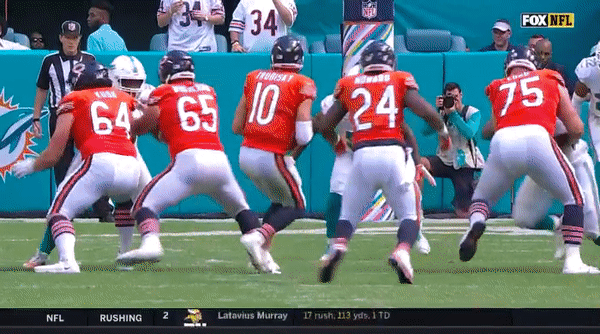
With the context, it's awful.
At the time, the Bears led by eight points. If they'd just settled for a field goal, they would've led by 11 points with 12 minutes remaining in the game. That probably would've won them the game. Instead, Trubisky threw a pass -- on first down, too! -- that looked like it was intended for the safety lurking over the top of the receiver's route, and the Dolphins tied the game three minutes later.
There's no positive way to spin that decision, but there is a positive way to spin his past two games.
Mitch Trubisky’s past two games: 41 of 57 (72 percent) for 670 yards (11.8 YPA), nine touchdowns, and one really bad interception. Trubisky has looked good in six of the past eight quarters. That’s the positive way to spin the loss to the Dolphins.
— Sean Wagner-McGough (@seanjwagner) October 14, 2018
And that just makes it even more unforgivable that Nagy refused to let Trubisky throw a pass in that final overtime sequence. His quarterback, outside of one throw, was playing remarkably well. He needed to give him a chance to make a safe pass or run for a first down.
3. Mike Tomlin's use of challenges
The Steelers beat the Bengals to get back into the AFC North mix, but they were forced to escape with a close win only because their coach mismanaged his challenges.
In the second quarter, Tomlin burned a challenge when the officials ruled Ryan Switzer down a yard short of the line to gain on third down. Spot challenges are always difficult to win unless they involve a ball creeping over the goal line. To no one's surprise, the officials didn't change the ruling on the field.
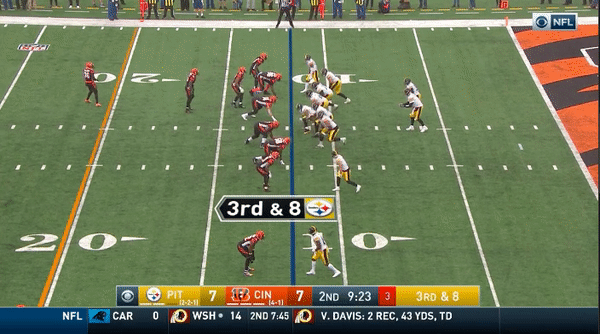
In the third quarter, with score knotted at 14-14, Steelers running back James Conner appeared to score a go-ahead touchdown with a 26-yard run. But the officials deemed that Conner gained only 25 yards and landed short of the goal line.
The replay appeared to show that the ball eclipsed the goal line.

Instead of using his final challenge, Tomlin decided to save that challenge and let his offense score one or two or three plays later. Well, the Steelers couldn't punch it into the end zone and they were forced to settle for a field goal.
That decision almost proved to be costly when the Bengals held a one-point lead with just over a minute remaining, but Antonio Brown's game-winning touchdown bailed Tomlin out and secured a huge win for the Steelers.
4. Marvin Lewis' fourth-down decision
Marvin Lewis did not get bailed by his team.
On the Bengals' first series of the third quarter, when the game was still tied at 14-14, they faced a fourth-and-1 from the Steelers' 40-yard line. At that point in the game, Bengals running back Joe Mixon was averaging 6.3 yards per carry. But in a move Jason Garrett would approve of, Lewis opted to punt and pin the Steelers at their own 12.
Cover your eyes:
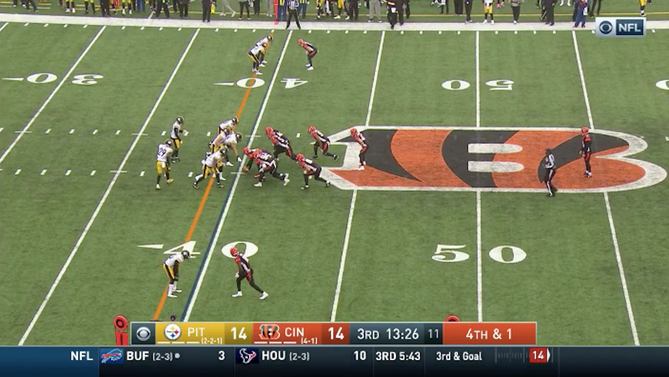
What happened next was predictable: The Steelers embarked upon a 12-play, 85-yard scoring drive that gave them a three-point lead (it likely would've been seven if Tomlin had challenged the Conner run).
Stop punting on fourth-and-short in enemy territory in the name of field position. You know what's more important than field position? Possession of the ball with a chance to score.
5. Emmanuel Sanders taunts instead of scores
In what ended up being a three-point game thanks to a late touchdown pass by Case Keenum, a taunting penalty loomed large.
In the early going of the Broncos' loss to the Rams, Emmanuel Sanders appeared to burn Troy Hill for a go-ahead touchdown. Sanders let Hill know that he got burnt, walking up to him and pointing his finger at his face. The officials threw a flag for taunting.
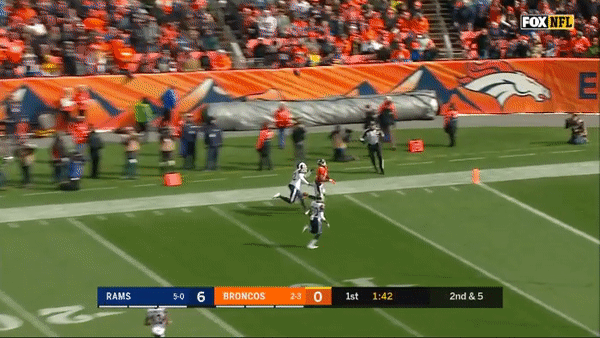
No big deal, right? The 15-yard penalty would just be tacked onto the kickoff and the Broncos would sacrifice a bit of field position -- not ideal, but far from disastrous.
Well, it turns out, the officials moved the ball back to the 1-yard line after a review. Except that, with the 15-yard penalty, the Broncos weren't actually at the 1-yard line. They were backed up to the 16-yard line and later forced to settle for a field goal. So, that flag probably -- assuming they would've been able to punch it in -- cost the Broncos four points.
Sanders acknowledged his blunder after the game, but also took aim at the league for flagging what he didn't think qualified as taunting.
"To me, honestly, I feel like the league is getting soft," Sanders said, per ESPN. "I'm having fun. I didn't do anything crazy to the guy besides say, 'I got you on that play,' pointing my finger at him. [The official] threw the flag, which is crazy because I feel like I've been in the league nine years and I've been pointing at guys, go back and look at my film, I've been pointing at guys all the time and saying, 'I got you on that play.'
"It was a great throw by Case. I came down with a big play, emotions are high. ... It's not like I walked up to him and head-butted him or something crazy. But it cost my team."
He's not wrong. It's a weak call and it cost his team four points. That being said, Sanders had to know that something like that can always draw a flag in today's NFL.
6. Peterman throws away a game
If I can include quarterback decision making on this list and if Nathan Peterman keeps getting snaps for the Bills, he'll probably become a staple of this story. What he did on Sunday was toss away a game that the Bills very well could've won.
After their defense prevented the Texans from scoring a go-ahead touchdown by holding them to a game-tying field goal, Peterman loosened up his arm for a potential game-winning drive. Instead, he got baited by Texans cornerback Johnathan Joseph, who was sitting on this short route the entire time.
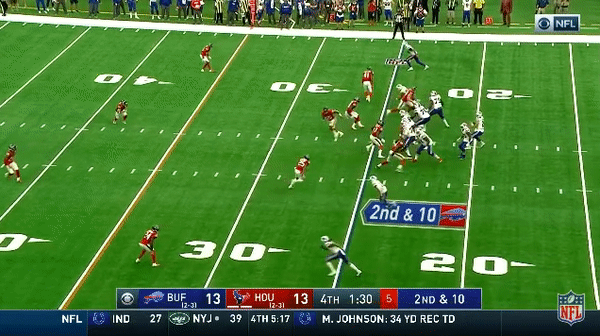
Like the Trubisky pick, there's nothing wrong with the physical aspect of the throw. Peterman could've thrown that anywhere in the vicinity of his target and it still would've been picked off. It's a decision-making problem. It's the kind of decision that makes coaches consider running out the clock at the end of regulation and playing for overtime.
7. Andy Reid keeps on kicking
It's fitting that we'll finish this story with Reid, who groomed Nagy on his staffs in Philadelphia and Kansas City.
On Sunday night, the Chiefs went into New England and lost to the Patriots, which marks their first loss of the season. There's no shame in starting 5-1. There's also no shame in losing to the Patriots in Foxborough. There is shame, however, in turning down potential touchdowns for short field goals when you're already losing. Settling for field goals on the road almost never beats the Patriots, but that's what Reid did.
In the second quarter, already trailing 17-6, Reid kicked a field goal instead of going for fourth-and-goal from the 6-yard line -- even though he might have the top offense in football and one of the worst defenses in football. Sure enough, the Patriots answered that field goal with a touchdown, turning an eight-point game into a 15-point game.
Reid did it again in the second half. Trailing by 11 points late in the third quarter, the Chiefs had a fourth-and-2 from the 12-yard line. Again, he kicked a field goal to cut the deficit to eight points. This time, the decision didn't come back to bite him as Tom Brady rewarded Reid's conservative approach by trying out his best Mahomes impression.
It didn't go well.
The @Chiefs defense is relentless and forces the Brady fumble!
— NFL (@NFL) October 15, 2018
Big turnover for #ChiefsKingdom. #KCvsNE
📺: NBC pic.twitter.com/S9xNfvjjYG
The Chiefs went on to score a touchdown. Again, Reid decided to kick. Down two, he selected a point-after attempt instead of a two-point conversion that could've tied the game.
ESPN's Brian Burke explained in the moment why that wasn't a smart decision:
The Chiefs made a mistake kicking the XP following their TD at the end of the 3rd quarter. They now trail by 1 with 10 minutes to play. According to ESPN's Win Probability (WP) model, the Chiefs needed just a 26% chance of conversion to make the two-point attempt worthwhile. League average is just under 50%. Overall it was a -2.0% WP error.
When the Patriots scored a touchdown to take the lead, they led by four. If the Chiefs had gone for two and gotten it, they would've needed only a field goal to tie the game.
With just under fourth minutes remaining in the fourth quarter, with the Chiefs trailing by four and facing fourth-and-7 from their own 28, Reid decided to punt. The Patriots got the ball back at their own 21-yard line. One big Gronk stiff-arm later, the Patriots were already inside the Chiefs' 40-yard line. They would kick a field goal to take a seven-point lead. The punt was pointless. The Chiefs turned down a chance to pick up a first down and gave the Patriots a chance to ice the game or at the very least, guarantee themselves overtime.
What happened next -- the Chiefs tied the game, but Brady led a late game-winning drive -- is irrelevant. I told myself that I'd include this section regardless of the final result. The Chiefs winning the game wouldn't have justified Reid's decisions. Process matters more than the final result.
But the Chiefs did lose by three after turning down nine additional points by kicking three times in situations that demanded more than field goals and extra points. They didn't need to convert all three of those chances. If they'd gone for touchdowns twice instead of those two field goals, they would've needed only one of those fourth downs to result in seven points to come out on top.
The process was bad regardless of the result. But since the result fits the process, well, I might as well mention it.
On the other hand ...
Look, man it’s Brady in Foxboro, OK> They could have made every sound decision in the world and a giant Squirrel would rise up and steal the ball from them like in CAddyshack. Some things are written in the tablets.
— Hardwood Paroxysm (@HPbasketball) October 15, 2018
Matt's sound logic aside, there are rules that have been long established. You probably won't beat the Patriots by kicking. You almost definitely won't beat them by kicking against them on the road. And you won't beat them by kicking field goals against them on the road while already facing a double-digit deficit.
Stop kicking field goals against the Patriots.













